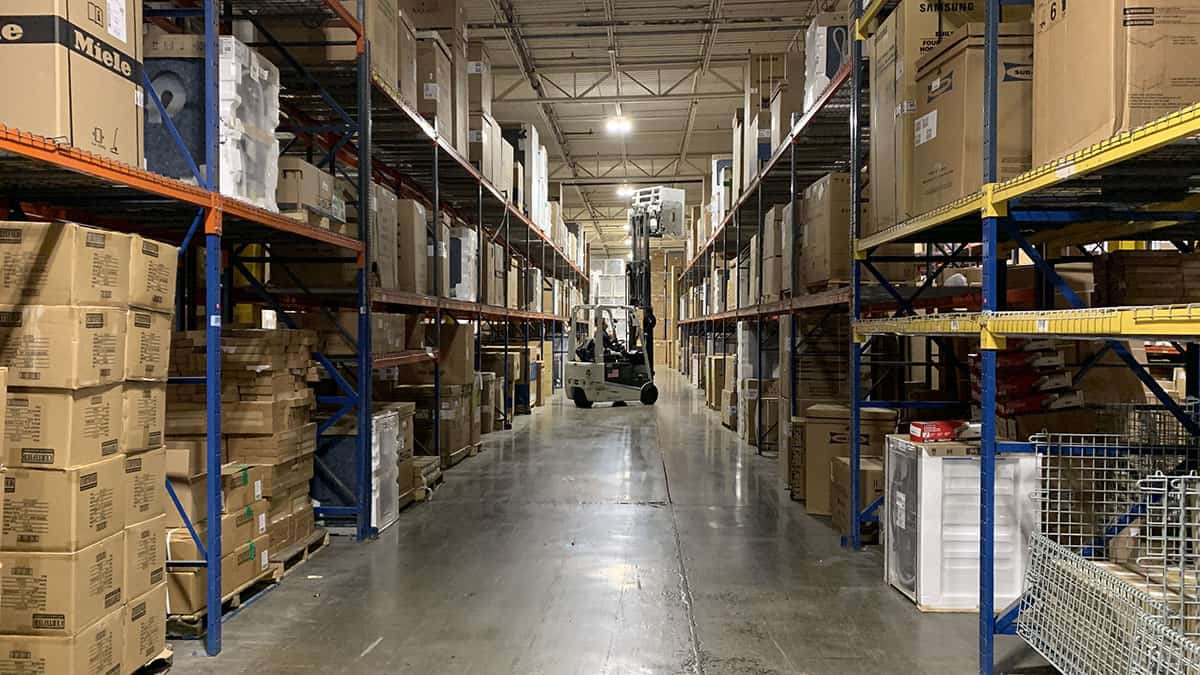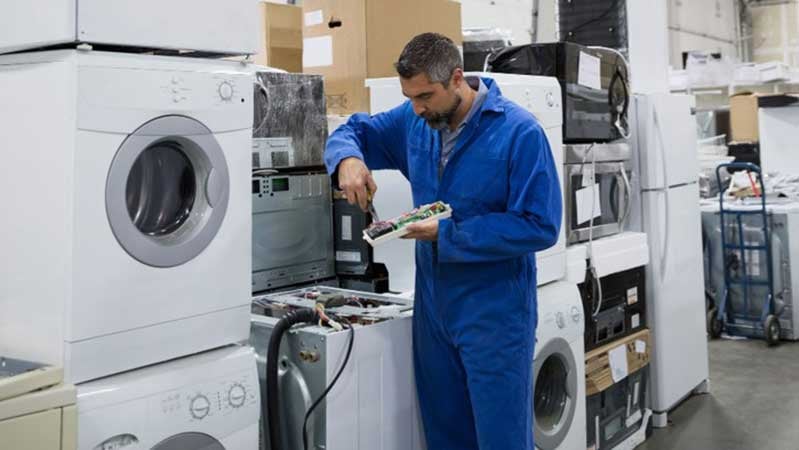Well, the port strike has been delayed to January 15th after just two days of picketing.
So read this as what will happen with a prolonged strike. If you are buying appliances or building a house be mindful of the delays it certainly will cause.
Article starts here
It's been a good year to buy appliances. Manufacturers have continued overproducing despite lower demand, resulting in great promotions throughout 2024.
However, this is likely to change with the ongoing East Coast port strike.
The labor dispute between port workers and management has caused significant delays at key shipping entry points, disrupting appliance availability and potentially driving up prices.
In this article, we'll cover which companies will be most affected and how you should approach buying appliances as we move into 2025—especially if you're planning a kitchen renovation.
Let's dive in.
Looking for answers about Appliances?
Short on time? Download our free Appliance Buying Guide.
How East Coast Port Strikes Are Disrupting Appliance Buying: What You Need to Know
Key Ports Affected by the East Coast Port Strike
More than half of the U.S.'s longshoremen are on strike, and the impact is felt across several East Coast ports.

The ports affected include Baltimore and Brunswick, Georgia—two of the busiest auto ports—and Philadelphia, which prioritizes fruits and vegetables.
New Orleans, a key hub for coffee, chemicals, and wood products, is also impacted.
Additional key ports impacted by the strike include Boston, Charleston, Houston, Mobile, New York/New Jersey, Norfolk, Savannah, Tampa, and Wilmington.
It's also important to note that the Port of Montreal is on strike, so rerouting ships there as a backup is not an option.
So, What Are the Implications of this Strike?
Roughly 50% of the freight imported into the U.S. goes through an East Coast port.
Depending on the source, the strike is estimated to cost the U.S. economy between $3.8 billion and $4.5 billion per day.
Without question, you probably won't be eating a banana anytime soon—75% of all bananas are imported through Philadelphia.
As we mentioned before, coffee imported through New Orleans may also be in short supply.
As of early October, the implications for appliances remain unclear.
However, a prolonged strike will significantly impact the appliance industry and many others.
It's estimated that recovering from just one day of the strike will take about a week, meaning an 8-day strike will affect Black Friday.
Anything longer could impact Christmas.
In fact, it may be wise to consider starting your holiday shopping sooner rather than later.
However, for appliance shopping, there are several important factors to consider.
The Lessons of the COVID-19 Pandemic
Many manufacturers learned valuable lessons from the COVID-19 pandemic that will help during this strike.
If we recall those challenging times, port backups crippled the industry and disrupted the entire supply chain.
However, COVID-19 affected every port indiscriminately.
Another factor that worsened the supply chain crisis was the practice of just-in-time inventory.
Just-in-time inventory means factories only keep enough stock for current production, making companies more profitable.
Holding more inventory comes with additional costs, such as warehousing, staffing, insurance, and other related expenses, that impact overall profitability.
However, having more inventory is beneficial during sudden spikes in demand.

LG was a huge winner during COVID-19 because they had more appliances readily available.
Lesser-known Turkish manufacturer Beko became popular—they had appliances to sell when others didn't.
Many manufacturers have since moved away from just-in-time inventory.
That said, manufacturers have been overproducing since 2022 due to diminished demand.
But have the retailers? That's the big question.
The severity of the impact in the short term is inventory in retailer warehouses.
But what should you do?
Well, that depends.
Best Tips for Buying Appliances Amid the East Coast Port Strike
How to Buy Appliances in the Next 60 Days
A strike is more predictable from an inventory management standpoint than COVID-19 was four years ago.
The Longshoremen announced this strike well in advance, allowing companies to plan accordingly.
For instance, imports were up 12.9% in September compared to the same month in 2023.
The ports on the West Coast remain open, and railroads can absorb some of the added burden of transporting products to the East Coast.
Additionally, there's an excess of appliances across the country, meaning that in the short term, you should be fine.
However, this could quickly change depending on how long the strike lasts.
Strategic Consumer Advice
If you're in the market for new appliances, it's wise to act quickly within the next six weeks.
To save time and money, opt for readily available models or consider alternative brands less affected by the strike.
Waiting for a resolution could lead to longer delays and potential price increases.
Black Friday and Beyond
That will all change on Black Friday. Keep in mind that Black Friday doesn't start on November 26th—it begins in early November.
Circle that date on your calendar.
You'll have both selection and promotions.
Manufacturers haven't yet reduced their Black Friday deals by 10-35% off all of November.
Note: Although Black Friday discounts from manufacturers are available now, most retailers will begin their promotions on November 1st.
Appliance Buying Strategy for the Next 180 Days
Buying on or before Black Friday is a smart strategy. It's the best way to save money and avoid delays in receiving your appliances.
Staying Ahead of the Curve
Stay informed about the strike's developments.
Being aware of potential disruptions and price increases will help you make informed purchasing decisions and minimize the impact on your plans.
If you're not ready to buy yet, start a quote and stay in touch with your appliance salesperson.
Buy when they say inventory is running low to avoid playing the waiting game with a prolonged strike.
What Appliance Companies Will be Most Affected
Let's take a look at the companies importing into the U.S. that are likely to be affected by the strike.
Major importers like Walmart, Bob's Discount Furniture, and others on this list will have major problems.
Here are the top 10 importers through the East Coast:
- Walmart
- Ikea
- Samsung
- Bob's Discount Furniture
- LG
- Home Depot
- Continental Tire
- Hyundai
- Dollar General
- General Motors
- Amazon
However, two major appliance companies stand out on this list: LG and Samsung.
While TVs make up a portion of their imports, appliances account for most of their import value.
Smaller European companies, such as Miele, Liebherr, Bertazzoni, AGA, Beko, and La Cornue, will also need to find other ports soon.
The burden of added shipping costs will eventually be passed down from manufacturers to retailers and, eventually, to you.
You will likely see fewer promotions in the appliance industry as the strike continues.
What Appliance Companies May Benefit from a Strike

You would expect American manufacturers like Sub-Zero, BlueStar, and Whirlpool to benefit the most from the strike.
GE and Bosch also have significant American manufacturing and should have more inventory available.
GE, Sub-Zero, and Bosch, in particular, are well-prepared, having likely learned the most from the disruptions caused by COVID-19.
As a result, these companies will likely hold out longer.
In the long run, American manufacturing jobs are expected to benefit.
If you're the CEO of an appliance company, you have two options:
- Deal with another painful supply chain issue with possible crippling consequences
- Invest in moving key component manufacturing to the U.S. to avoid future disruptions.
This move would provide more flexibility in promotions and quicker time to market.
The Long-Term Consequences of Buying Appliances in 2025 With a Strike
Foreign Parts Dependency
Every domestic and foreign manufacturer, without exception, relies on foreign parts.
Yes, there's currently a surplus of appliances
However, you can't build a dishwasher with only 31 out of 34 parts.
Reduced Selection Over Time

Eventually, we're going to face less selection. You'll likely have to order months in advance because key parts won't be immediately available.
Repairs

That could be even worse.
Parts for repairs are always a lower priority compared to new appliance sales, so you can expect 30-day repair cycles—or even longer—if the strike continues.
Long-Term Concerns
I'd be concerned about this heading into 2025 if the strike is prolonged.
An extended strike could lead to severe shortages and a backlog that may take months to resolve once the ports return to normal.
Renovation timelines could be thrown off, and project costs may rise significantly.
Key Takeaways
First, there's no need to panic yet.
You can be conservative and buy now. You will have your appliances.
Wait until November 1st—you'll still have a good selection, along with reduced costs thanks to added retailer promotions.
Many brands and appliances will still be available since manufacturers are dealing with a surplus.
At the very least, start a list of appliances and get quotes from appliance stores.
Stay in touch with the salespeople, and be ready to buy when inventory becomes scarce.
While a prolonged strike will eventually affect how you buy appliances, it won't be as bad as COVID-19 because companies are more prepared (we are), and half the ports remain open.
However, keep the following in mind with a longer strike:
- Immediate Delivery Delays: Expect disruptions in the arrival of imported kitchen appliances due to the strike.
- Potential for Price Hikes: As supply dwindles and rerouting costs increase, appliance prices may rise, and promotions may be canceled, impacting your budget planning for kitchen projects.
- Extended Impact: The longer the strike continues, the greater the disruption to appliance availability and project timelines.
- Proactive Purchasing: Evaluate in-stock options or alternative brands to avoid long wait times and higher costs.
- Continuous Updates: Stay informed about the latest developments in the port strike to manage your expectations and plan effectively.
If you're a builder working on a large project or a consumer outfitting your kitchen in 2025, it's important to stay proactive and plan ahead.
Additional Resources
Download the Yale Appliance Buying Guide covering all topics of appliances. Over 1 million people have read a Yale Guide.
Related Articles:








